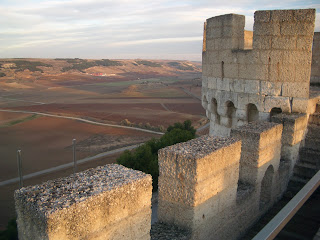Is there anything more beautiful in life than the joys of breaking bread and sharing wine and food around the table with friends? As I have written here before, there is some scientific evidence of the health benefits of wine with food and companionship, and it helps to explain why wine’s anti-aging properties can’t be reduced to biochemistry and put into a pill. So with that in mind, let me express thanks to some new friends in Spain from my visit to Madrid and the Ribera del Duero.
Rebeca Colina Giralda gave us a wonderful tour of the Abadia Retuerta vineyards and a tasting of their magnificent wines. The juxtaposition of modern winemaking in a thoughtfully restored centuries-old abbey was an inspiring experience, and the wines are wonderful. Running into Rebeca at a tapas bar in Valladolid the next day was like seeing an old friend!
But few have done more to advance winemaking in the Ribera than Alejandro Fernandez, founder of the Tinto Pesquera group. We had the great pleasure of having lunch with one of his daughters, Lucia Fernandez Rivera, and got to know her and the wines (Pesquera, La Granja, Condado de Haza, and El Vinculo.) Their new hotel, another caringly restored old building in the same vein as Abadia, is well worth a visit.
But not all the winemakers in the Duero are adherents to tradition, as in the case of Richard Sanz of Sitios de Bodega. We had a phenomenal dinner with Richard and a small group at the new symphony hall in Valladolid, showcasing modern Spanish cuisine with a range of wines. Bravo!
Thanksgiving dinner (just happened to be that day, not a Spanish holiday) was an experience so unique that I doubt any American has ever done it before. We enjoyed a private tour of the traditional musical instruments museum run by the multitalented Paco Diaz, who then took us to his 400-year old Bodega cave in Cigales and prepared a truly memorable meal. As you might imagine, there was plenty of local wine, singing, and camaraderie. Our companion for the evening was Angel Moreton, director of the new and very sophisticated International School of Culinary Arts. If you have a chance to visit (and I hope you do) look for a copy of my book in their library.
Back in Madrid we had the great privilege of dining at the Café de Oriente with Alfonso de Salas, of the Spanish newspapers El Mundo and El Economista, and founder of the splendid winery Montecastro. Definitely get your hands on some of this wine, and look for a review of my book in the Spanish press.
Thinking back on these memorable experiences, I feel healthier already. And send me an email if you want to know where the best undiscovered medieval hill town in central Spain is, or for more recommendations on Spain’s remarkable Tempranillo wines.

Comments
Post a Comment